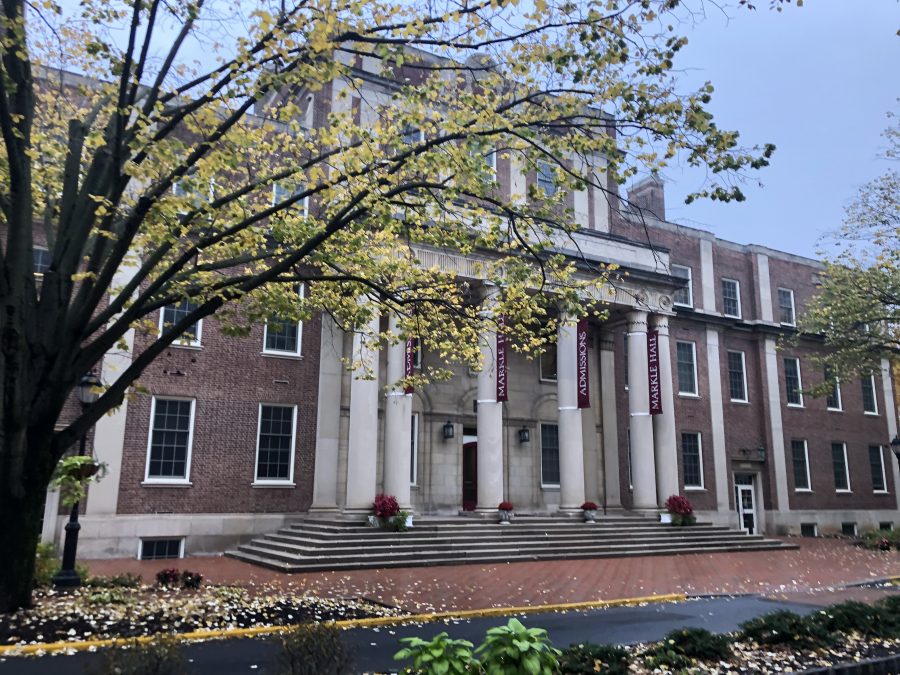Student climate change activists rushed the field to protest their university’s investments in fossil fuels at one of the oldest rivalries in college football last month. It was not at Laf-Lehigh.
Harvard and Yale students disrupted the crowd at halftime of the Yale-Harvard football game on November 23, carrying signs like “Harvard and Yale complicit,” according to the New York Times. They were protesting both schools’ investment in fossil fuel companies and demanded that the schools divest their endowments from these companies, something which Harvard has declined to do for years. 42 summonses were issued that day for disorderly conduct by the Yale police.
Harvard and Yale are not alone in their investments in oil and gas companies. The movement towards divestment from such companies started at small schools like Swarthmore in 2012 and now involves thousands of organizations across the globe, according to the New York Times.
Chief Investments Officer Joseph Bohrer said that 1% of Lafayette’s $830 million endowment is invested in fossil fuels. He noted that all of these investments are in private oil and gas companies which are not listed on the stock exchange.
“We’re invested in multiple funds that are themselves fully invested in multiple funds, and so uncovering everything that is part of the overall investment portfolio is something that would take a little bit of work,” President Alison Byerly said. “It’s kind of a complicated picture.”
The main purpose of the college endowment is to subsidize the cost of education for students, as the cost to educate a single student for four years is significantly higher than the cost of attendance, according to Vice President of Finance Roger Demareski. The school also takes 5% of the endowment as an additional revenue source each year to contribute to the operating budget.
In 2015, the Lafayette published an op-ed calling for divestment from fossil fuel companies. Since then, the conversation has died down significantly.
“I don’t recall a time recently that we’ve been asked about the nature of the holdings,” Byerly said. “[We get asked] more about what funds have done well and which ones haven’t and how we could maximize the value of the endowment.”
Bohrer said that the approximately 30 investment managers the college hires to invest portions of the endowment “explicitly consider” the potential costs of climate change in their investments, and whether or not the companies they invest in have a strategy to “transition to a low or zero carbon economy.”
In terms of “other environmental and social concerns,” Bohrer said it is “less clear” what the college’s approach should be, and that the decision ultimately rests with the Board of Trustees.
Demareski said that it can be difficult to continue growing the endowment while still investing in companies that represent the college’s values.
“On one hand, we want to grow the endowment…because it provides better support to campus, and it provides long term financial health, and there are some sectors that may have more growth than others,” he said. “Some folks might have an opinion that we should be in a sector or not in those sectors.”
“I certainly can see the side of students who might say, ‘we should not [invest in those sectors],’ and then I put on my fiduciary hat as a leader of the college and say, ‘but our job is…to grow the endowment because it subsidizes our education,’ and it allows us to do things like…have a 48% financial aid rate,” he added. “The endowment…is a huge part of our financial aid plans.”
The college has also pledged to go carbon neutral by 2035 as part of the Climate Action Plan (CAP), but conversations around the college’s investment portfolio have historically excluded environmental considerations.
“We have not in the past talked about our investments as occupying that same space,” Byerly said.
“That doesn’t mean we couldn’t have that conversation in the future,” she added.
Bohrer said that the college has a “clear legal” obligation to invest the endowment, which comes entirely from donor gifts, in a way that “maximize[s] returns.” However, he said that the college is also obligated to consider the concerns of the community when making decisions on investments.
“In my personal opinion, climate change is a clear, urgent, near-term issue of potentially very large impact,” he wrote in an email. “Hence, common sense dictates that we take it into account when making investment decisions.”
“With respect to other social or environmental issues, the right course seems less clear to me,” he added.

























































































































